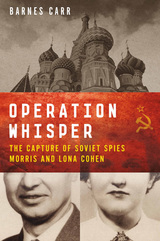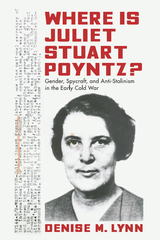2 books about Espionage, Soviet

Operation Whisper
The Capture of Soviet Spies Morris and Lona Cohen
Barnes Carr
University Press of New England, 2016
Meet Morris and Lona Cohen, an ordinary-seeming couple living on a teacher’s salary in a nondescript building on the East Side of New York City. On a hot afternoon in the autumn of 1950, a trusted colleague knocked at their door, held up a finger for silence, then began scribbling a note: Go now. Leave the lights on, walk out, don’t look back. Born and raised in the Bronx and recruited to play football at Mississippi State, Morris Cohen fought for the Loyalists in the Spanish Civil War and with the U.S. Army in World War II. He and his wife, Lona, were as American as football and fried chicken, but for one detail: they’d spent their entire adult lives stealing American military secrets for the Soviet Union. And not just any military secrets, but a complete working plan of the first atomic bomb, smuggled direct from Los Alamos to their Soviet handler in New York. Their associates Julius and Ethel Rosenberg, who accomplished far less, had just been arrested, and the prosecutor wanted the death penalty. Did the Cohens wish to face the same fate? Federal agents were in the neighborhood, knocking on doors, getting close. So get out. Take nothing. Tell no one. In Operation Whisper, Barnes Carr tells the full, true story of the most effective Soviet spy couple in America, a pair who vanished under the FBI’s nose only to turn up posing as rare book dealers in London, where they continued their atomic spying. The Cohens were talented, dedicated, worldly spies—an urbane, jet-set couple loyal to their service and their friends, and very good at their work. Most people they met seemed to think they represented the best of America. The Soviets certainly thought so.
[more]

Where Is Juliet Stuart Poyntz?
Gender, Spycraft, and Anti-Stalinism in the Early Cold War
Denise M. Lynn
University of Massachusetts Press, 2021
On a sweltering June evening in 1937, American Juliet Stuart Poyntz left her boardinghouse in Manhattan and walked toward Central Park, three short blocks away. She was never seen or heard from again. Seven months passed before a formal missing person's report was made, since Poyntz worked for the Soviet Secret Police and her friends (many of whom were anti-Stalinist radicals in the United States) were scared to alert authorities. Her disappearance coincided with Josef Stalin's purges of his political enemies in the Soviet Union and it was feared that Poyntz was a casualty of Soviet brutality.
In Where Is Juliet Stuart Poyntz?, Denise M. Lynn argues that Poyntz's sudden disappearance was the final straw for many on the American political left, who then abandoned Marxism and began to embrace anti-communism. In the years to follow, the left crafted narratives of her disappearance that became central to the Cold War. While scholars have thoroughly analyzed the influence of the political right in the anti-communism of this era, this captivating and compelling study is unique in exploring the influence of the political left.
In Where Is Juliet Stuart Poyntz?, Denise M. Lynn argues that Poyntz's sudden disappearance was the final straw for many on the American political left, who then abandoned Marxism and began to embrace anti-communism. In the years to follow, the left crafted narratives of her disappearance that became central to the Cold War. While scholars have thoroughly analyzed the influence of the political right in the anti-communism of this era, this captivating and compelling study is unique in exploring the influence of the political left.
[more]
READERS
Browse our collection.
PUBLISHERS
See BiblioVault's publisher services.
STUDENT SERVICES
Files for college accessibility offices.
UChicago Accessibility Resources
home | accessibility | search | about | contact us
BiblioVault ® 2001 - 2024
The University of Chicago Press









